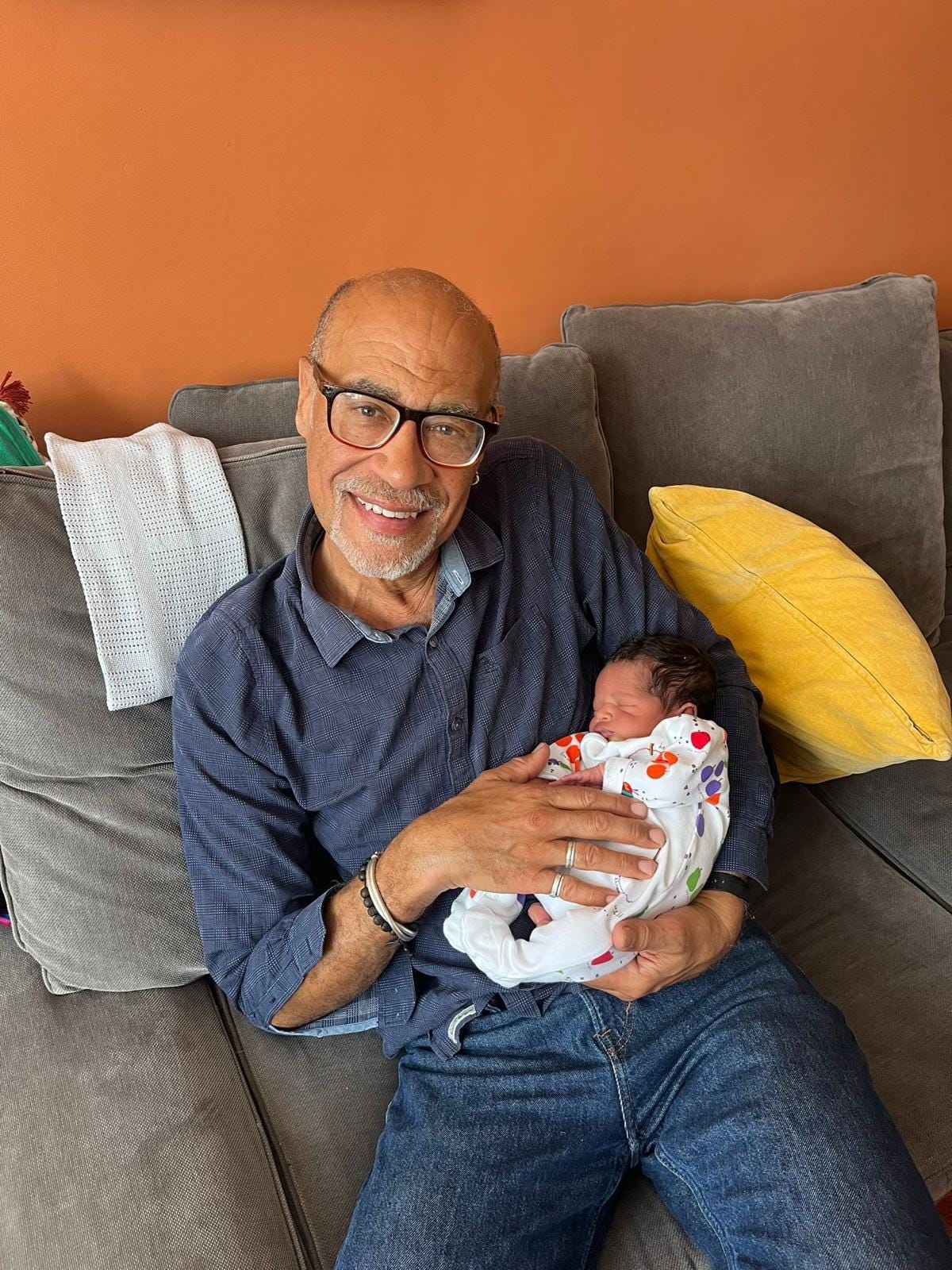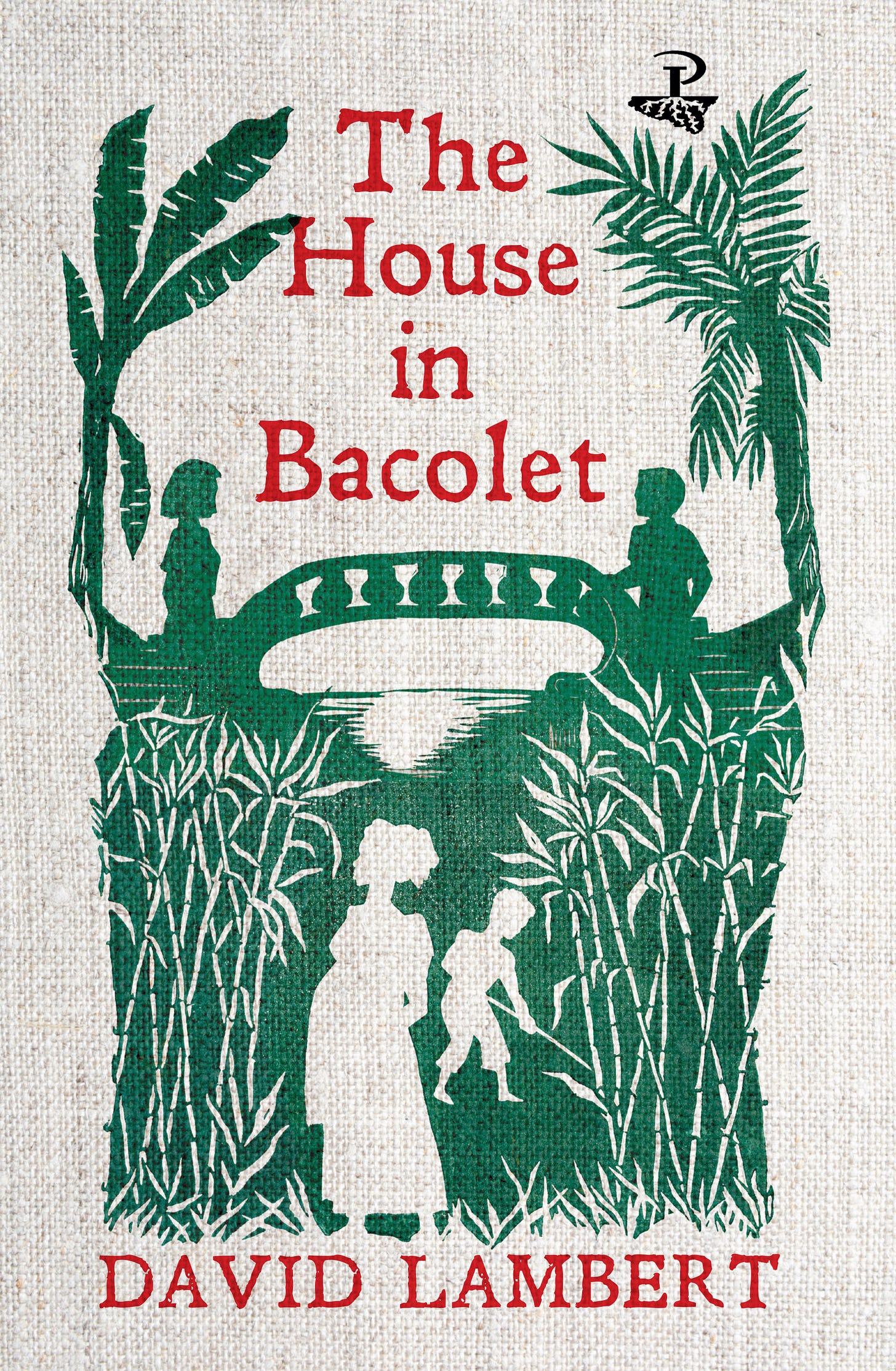David Lambert talks to me about how his dream of being a creative and involved grandfather has had to adjust as reality kicks in, but how the best bits are the unexpected. David is an author, lecturer and also runs writing courses from his house in France with his wife Michèle.
You can read more about the couple’s idyllic retreats for writing and language learning here
David’s novel The House in Bacolet, which I am itching to read, comes out next year. (More info below.)
David and Michèle have two children, a son and a daughter, and four grandchildren, ages 6 and 2 ( with their son) and 3 and 7 months ( with their daughter).
David didn’t have his own grandparents, they all died before he was born. But it meant he created his own vision of how he could be as a grandad. I discuss the way many of us boomers lost our own grandparents before we were born in my post 'Grandparental roles and role models' here.
As a creative person, a language lover and a writer, David had imagined all the creative things he could do with his grandchildren. However, as so many of us new grandparents are finding, our best laid plans can be thwarted in the most unexpected ways as we learn to become grandparents to the children of Millenials.
I look at some of the ways our expectations have to be adjusted in the post Transitions here.
Becoming a grandparent is nearly always a learning curve, and as David found, the lessons are not always the same with each child and their children.
But first I want to hear what has been surprising to David about becoming a grandparent.
3 surprises
1 Deja vu
I’d found the end of my own children’s early childhood difficult to come to terms with. It coincided with us moving as a family back to England after two years on a Caribbean island. It was so hard for me I actually sought counselling to help me through that time of grieving for their childhoods. Now one of my little grandchildren looks exactly as my son did. Another looks the spitting image of my daughter. These uncanny echoes of my own young children in my life again is a very special sort of déjà vu. It's as if I'm reliving something precious that I’d lost long ago. Having young children back in my life , reliving that time that I found so hard to relinquish, is a real blessing to me.
2 Hugging
One of my son’s children loves to hug. He hasn’t started talking a lot yet but expresses himself physically. Our daughter’s little boy is less into hugging and they don’t force him to. And so it’s lovely that this little one volunteers the hugs himself. He holds out his arms when we arrive on a visit and comes straight at you for a cuddle.
3 Different parenting styles
It's a surprise to observe the very different ways my daughter and son choose to parent, given that they share us as their parents! My daughter uses ‘gentle parenting,’ which means no enforced hugging and not saying no! My son is more conventional and firm and says no, but he and his partner started out bringing up their daughter as gender neutral. So they gave her power tools as well as dolls, and were careful about the language they used. And yet their girl who’s now six is into pink everything and princesses and fairies. So it seems the children turn out the way they’re going to anyway!
3 things you’ve found difficult
1. The stories I wanted to tell them
As someone who loves language and story-telling, and who wrote stories for my own children when they were little, I’ve found it hard having to rein in that side of myself, in order to ‘fit’ with my children’s belief systems. I do not disagree with their views, but it’s sometimes hard to get it right. I’ve sent the parents recordings of my stories to play to the children but they don’t seem to have played them. I’m not sure why not. It’s possible that some of the characters I’ve used are not to their liking, not PC enough? I use a lot of foreign and regional accents, perhaps that’s not OK any more.
2 Adapting my language
I’ve always loved language and use terms like ‘motherese’ to describe the way we talk to young babies and children, but my son was equally present in teaching their first- born to speak so he feels the term a bit exclusive of fathers. I do understand how he feels. Maybe we should say ‘parentese’ and ‘parent tongue’? I am happy to adapt my language, but it can be hard at times to see things coming!
3 The children don’t often come to see us in our house.
I always imagined having all the grandchildren to stay and play at our house. They all live two hours drive away- not on the other side of the world but on the other side of London which can feel like the other side of the world when you’re traveling in a car with very young children. We’re happy to go to them to do childcare or to babysit. But the grandkids are not having that experience of going to Grandma and Grandad’s house that I hoped they’d have. I imagined them building memories and talking about all the house’s objects and smells. I’d really have like them to associate us with this place, our house.. But that just isn’t happening.
Beer in the bed?!
A few more thoughts
‘When we babysit we have to take our own wine. My daughter didn’t even have wine glasses so we had to buy her some the first time we went to look after her baby. Our children don’t drink much at all. One of the grandchildren told my daughter ‘Didi (that’s what she calls me) gave me alcohol’ because I’d let him taste my wine. He dropped his granddad right in it!
(This makes me laugh, and I tell him the time we’d stayed overnight to babysit, and my granddaughter aged three ( getting us up at the crack of dawn) said to her grandad (who she calls Grandy) ‘Grandy you’ve left your beer in the bed’, pointing at the bottle of water he keeps by his bed.)
But overall what I’m getting from David is the sense that while we grandparents mostly do our best to get it right, and to be there as much as possible for our grandchildren, we cannot write the script in advance. We have to learn as we go, listening to our children and adapting.
‘We always imagined we’d have these idyllic family gatherings with the children and their partners and all the grandchildren. Last summer we thought we’d get the whole family to stay at our house in France so the grandchildren (then aged 4, 1 yr and 2yrs ) could all be together. Michele went to great lengths to plan activities, buy a new paddling pool, and to prepare meals and get the house aready for them. And It was a complete disaster!!
The one year old (our son’s second child) had chicken pox.
We didn’t know then that our daughter was trying to get pregnant [with her second child.]
She was afraid of being in contact with chicken pox since it can be dangerous when you’re pregnant.
As a result there could be no collective frolics for the children in the new paddling pool! Also the children were all on different eating and sleeping (or not sleeping) schedules. So we ended up going on different outings, driving around in two lots of cars.
The grandchildren saw less of each other than they do normally.
No one slept. It was incredibly stressful. To top it all, at the end of the week we all got covid.
We decided we’d NEVER try to do it again.
His account reminds me of how the best laid plans are so often thwarted when there are small children or babies in the mix, all with differing needs and timetables. And, though I feel guilty saying it, it’s oddly reassuring to hear it isn’t just our family who sometimes have a confluence of illnesses, sleepless nights, anxieties, and particular requirements that leave everyone worn out and deciding to abandon the idea of the extended happy family gathering!
However, (David continues,) by chance, this year we had access to a four star hotel in Spain and it was everything the other holiday wasn’t. There were swimming pools and fun things for the children to do and it was perfect.
We just took one family and will take the other next time. It didn’t achieve the aim of getting them all together at once, but perhaps that just isn’t going to happen whilst all the children are so young.
And this is perhaps the takeaway I get from David’s account of being a granddad,
That you have to throw away the picture you had of the grandparent you were hoping to be, and embrace the unexpected moments instead.






